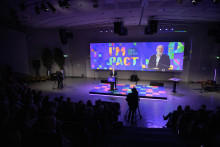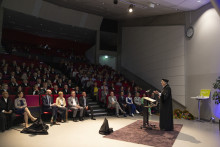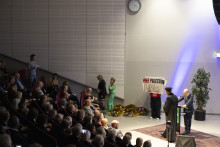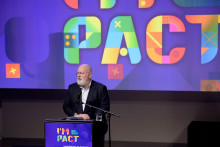There are many changes in the pipeline in the (academic) world, such became clear from the speeches by rector Tom Veldkamp and keynote speaker Frans Timmermans. But some things never change, like the cortège of professors and the traditional Gaudeamus igitur, sung by Cnødde. After the university song, rector Veldkamp took the floor to announce the chosen course of the UT to a well-filled Waaierzaal.
The emphasis was on societal impact, the central theme of this Dies. The world faces existential challenges with the climate crisis, according to the Rector. That is why, in addition to themes such as health, safety and semiconductors, the UT wants to focus more on climate in the coming years. In his speech, the rector also described lifelong learning as the essential fourth leg under the table of University Twente. ‘Because in this rapidly changing world, knowledge quickly becomes outdated.’
Firework disaster
After his short speech, the Rector gave the floor to Frans Timmermans, Vice-President of the European Commission and responsible for the European Green Deal. He started his Dies lecture with a compliment to the city of Enschede. ‘I remember how we, in the Dutch Parlement, heard the horrible news about the fireworks disaster, 23 years ago tomorrow, and how we looked for ways to help. I was especially amazed by the civic sense and solidarity of the citizens of Enschede after the disaster.’ It was a comment that triggered applause from the audience - and it was not the last time this Friday afternoon.
English
Before Timmermans got to the core of his speech, there was one more thing he needed to get off his chest: the importance of internationalization in higher education and English as academic lingua franca. ‘Internationalization is one of the most important things for Dutch education. It prepares our universities for the future. If we throw that away we are penny wise, pound foolish. The costs do not outweigh the huge added value for Dutch society.'
The European Commissioner turned out to be an avid supporter of English at Dutch universities, something that has been the subject of a fiery discussion lately. Timmermans called on the audience to stand up against forces that want to get rid of English. ‘We do not neglect Dutch by speaking English at universities, but by no longer reading to our children before going to sleep. If you learn to speak your mother tongue well as a child, an additional language is only a huge extra. Do not be fooled into thinking that English is bad for the Dutch language. Do not forget: it is the first time in human history that we have a lingua franca that does not only apply to the elite.’
‘Climate change on steroids’
Once again there was applause from the audience. And Timmermans' real speech was yet to begin. In his core speech, the European Commissioner emphasized the importance of time. Climate change is of all times, he stated, and it always caused major social consequences, such as migration flows and wars. ‘But now we are dealing with climate change on steroids. Moreover, for the first time, it is caused by human behavior.’
Due to the severity of this climate change, the social consequences will be far greater, Timmermans predicted. According to him, humans are the first species on this planet that can destroy itself. ‘For us, it is not about saving the planet – the planet can take care of itself. It is about saving humanity.’
Act now
Back to the factor of time, the core of Timmerman's argument. According to the European Commissioner, universities have the unique knowledge to look into the future. ‘Yet I often get the impression that we do not want to look at this future at all. Many people are stuck in a perfect Groundhog Day, where everything comfortably seems to stay the same. But doing nothing will mean decline.’
It is crucial to act now, Timmermans stressed. ‘Be a good ancestor. I want our children to be left behind as well as we will be. We can fix it, if we can transform our society.’ Hence the European Green Deal, continued the European Commissioner: the plan for a climate-neutral Europe in 2050. 'Again, everything revolves around the factor of time. A Green Deal for 2050 was easy. But it is not enough if we want to fulfil our role as good ancestors. We need to start making changes now.’ An enthusiastic shout is heard from the audience.
Exclude nobody
The post-war generations have failed in various areas, Timmermans continued. Current generations will therefore regularly have to take two steps back, for example by consuming less, to leave a liveable world for their children and grandchildren. ‘One thing we did do well. I hear from professors how young students have changed. Twenty years ago, students wanted to work at Shell and earn a lot of money, nowadays they want to help create a liveable future. That’s why I think: there are some things our generation did quite well.’
Timmermans had one more tip for the students: do not exclude anyone from the climate debate, not even the fossil fuel industry. ‘Make them change, that does not happen by excluding people. Rediscover the noble art of disagreeing. Enter into a debate, speak out against those who deny climate change.’ He concluded his speech. ‘This is the way!’
Four awards
Four prizes were awarded during the 61st dies natalis of the UT: the Marina van Damme grant, the Professor de Winter prize, the Overijssel PhD Award and the Brinksma Innovation Grant.
The winner of the Overijssel PhD Award, a cash prize of 5000 euros and a certificate for a thesis of ‘excellent scientific quality’ was Hanneke Kip. She obtained her PhD cum laude in 2021 for research into the use of eHealth interventions in the treatment of people who have committed aggressive or sexual offences. Andries Heidema, Commissioner of the King, presented the prize on behalf of the Province of Overijssel.
The Brinksma Innovation Grant (BIG for short) for an innovative educational concept – named after former rector Ed Brinksma – went to Michelle Kip and Xavier Pouwels of the BMS Department of Health Technology and Services Research. They plan to teach students to use so-called large language models such as ChatGPT responsibly, specifically in the field of programming health economic models. The winners received a figurine in the shape of a piglet and the space to experiment with this educational concept for a year.
The Professor De Winter Prize went to Florence Metz, assistant professor at the BMS Department of Governance and Technology for Sustainability. The ‘publication prize for top female talent’ is accompanied by 2500 euros and a certificate.
Last November, the original Dies date, it was already announced that UT alumna Nicole Vermeulen was the winner of the Marina van Damme grant, worth 9,000 euros. The runner-up was alumna Mariëlle Feenstra, who currently works at TU Delft as a postdoc.






